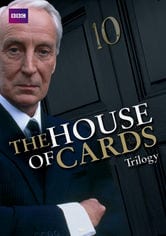 The recent glossy American remake has brought a new audience to the political drama House of Cards, but the original BBC drama from the 1990s has been a feature of our first year politics course for a number of years, and does bear repeated viewing.
The recent glossy American remake has brought a new audience to the political drama House of Cards, but the original BBC drama from the 1990s has been a feature of our first year politics course for a number of years, and does bear repeated viewing.
House of Cards was first broadcast in November 1990 and coincided with the end of Margaret Thatcher’s premiership, and the subsequent leadership contest which saw John Major become Prime Minister. The BBC drama was based on a novel written by Michael Dobbs, who was the Major’s Chief of Staff and Deputy Chairman of the Conservative Party. A role for which Dobbs was rewarded with a seat in the House of Lords, where he remains.
House of Cards certainly caught a particular mood in the early 1990s and the similarities between Thatcher’s downfall and some of the events in the drama were not lost on observers at the time. Aside from creating in Francis Urquart one of the more monstrous caricatures in British political drama, it highlights, in particular, the precarious position of the Prime Minister, for whom the real threat so often lies not with the Opposition but in one’s own party. Dobbs, who was working on Major’s leadership campaign at the time, later claimed that work in the campaign office came to a standstill when House of Cards came on the television. Geoffrey Howe, the Conservative Deputy Prime Minister whose resignation sparked the crisis in Thatcher’s leadership in 1990, later wrote in his memoirs that at the time some assumed that he was orchestrating a conspiracy like that created by Francis Urquhart in the programme (G. Howe, Conflict of Loyalty, p.658). Although those who are familiar with Geoffrey Howe may find the comparison risible.
Another similarly improbable comparison may be made between Urquart and John Major. In the insomnia-defying memoirs of Nigel Lawson, the former Chancellor makes an interesting observation that Thatcher had wanted to appoint John Major as Chief Whip (the position occupied by Francis Urquhart) but that Lawson had persuaded her to bring Major into into the Cabinet as Chief Secretary to the Treasury. Lawson observes that had Major been made Chief Whip, like Urquhart at the beginning of House of Cards, there would have been no possibility of him succeeding Thatcher as Prime Minister.
While the drama is in some respects, of its time, House of Cards has now entered political mythology. Phrases such as Urquhart’s ‘put some stick about’ and ‘you might say that but I couldn’t possibly comment’ have entered the political lexicon and are often repeated by MPs and political commentators who consider such things to be the height of wit and learning. It has also become something of a by-word for political conspiracy. Dobbs’ drama certainly came back to haunt John Major who suffered considerably at the hands of his own backbenchers, something which was not lost on the Opposition. For example in a parliamentary exchange in 1995, Tony Blair, then Leader of the Opposition, taunted Major about the divisions in his ranks:
Tony Blair (Lab – Sedgefield) If the divisions are so deep and irreconcilable that the Conservatives cannot govern themselves, why on earth should they be trusted to govern the country? Did not the Foreign Secretary get it right in Cannes during the summit, when he said that those divisions were damaging Britain? Does the Prime Minister–who at least is behaving with some semblance of honour and integrity throughout this–know what was happening while he was trying to represent Britain abroad? The friends of the Employment Secretary and the friends of the President of the Board of Trade were twisting the knife, striking deals and briefing the papers in a way that would have made Mr. Francis Urquhart blush. That is what happened while the Prime Minister was in Cannes. Has not the last week exposed the real Conservative party, in all its deceit and squalor? It is an ungovernable party that is unfit to govern, and the sooner that this country is rid of the Conservatives–all of them–the better for Britain. (Hansard – Commons, 28 June 1995, col.897).
Whether the Whips still enjoy the kind of control demonstrated by Urquart, if indeed they ever did, is a moot point. A recent piece on the Total Politics blog argued that the powers of the Whips have been eroded since the 1990s. Recent years have seen their powers of patronage diminished by a shift in control over select committee appointments to Parliament, while as mentioned in a previous post, the Coalition government has meant the rewards of Ministerial office are more thinly spread than in the past. The growth in the number of special political advisors also means that Whips no longer have a monopoly when it comes to providing the PM with advice about talent and troublemakers within the Party, and as the TP post suggests the real masters of the dark arts are now often the media advisors. Nevertheless, it is clear that much of the mystique around the Whips remains, and it is something which Party Whips, and the media, seem more than happy to perpetuate. Moreover, unlike some of his predecessors, Michael Gove, certainly has something of the Francis Urquart about him, and like Urquart his appointment as Chief Whip may well have come as something of a disappointment. One can’t help wondering if it is an appointment the Prime Minister will come to regret.
